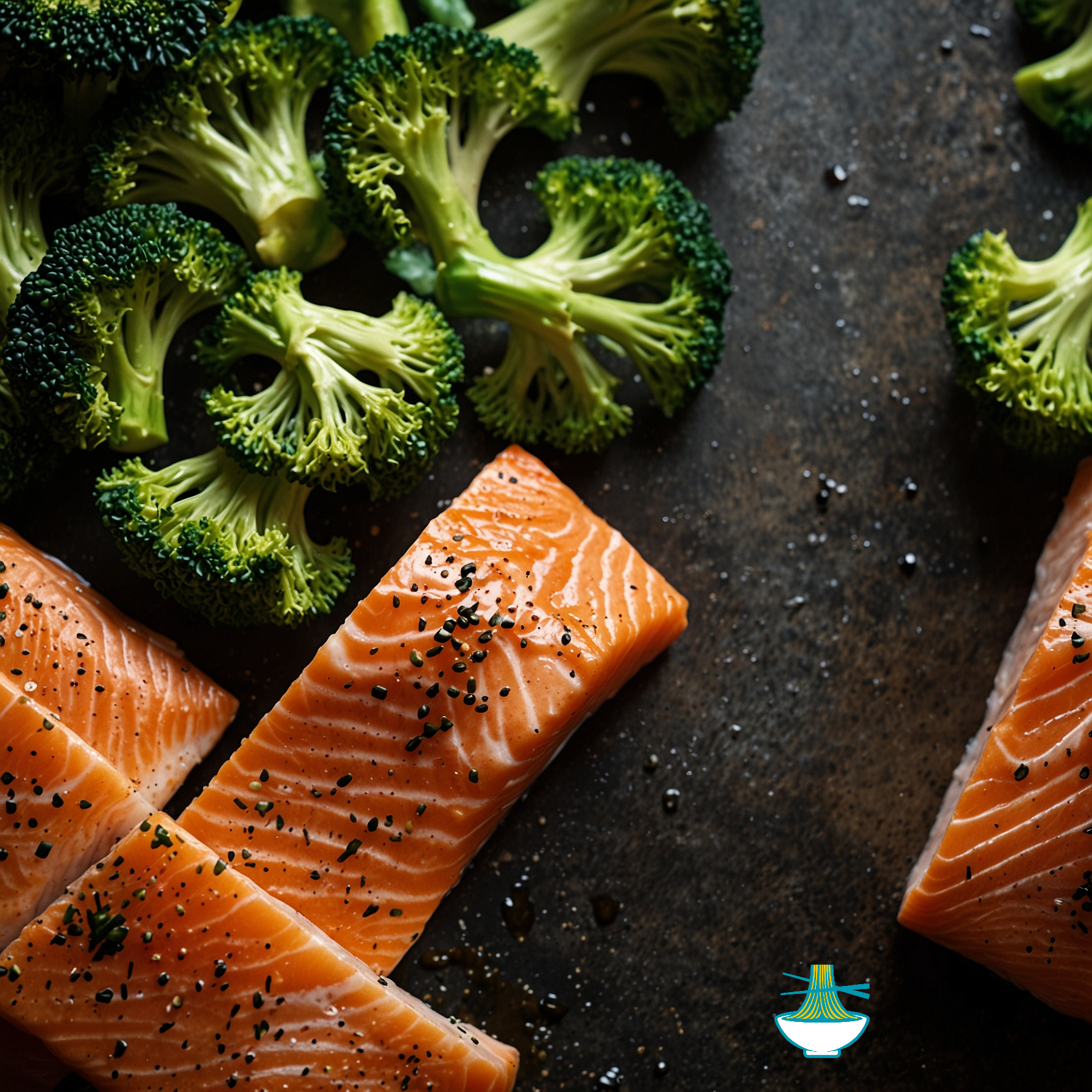Salmon with Steamed Broccoli: A cancer patient-friendly recipe featuring lean protein and fiber-rich greens. Inspired by the nutritional needs of individuals undergoing cancer treatment, this dish combines the goodness of omega-3 fatty acids from salmon with the vitamins and minerals of steamed broccoli. The recipe's origins lie in the growing awareness of the importance of diet in supporting cancer patients' overall health and well-being.
Inspired by the nutritional needs of individuals undergoing cancer treatment, this dish combines the goodness of omega-3 fatty acids from salmon with the vitamins and minerals of steamed broccoli. The recipe's origins lie in the growing awareness of the importance of diet in supporting cancer patients' overall health and well-being.
Ingredients:
- Salmon fillet
- Broccoli
- Olive oil
- Lemon juice
- Salt and pepper to taste

Note: Opt for unsalted, fresh salmon and organic broccoli from a trusted source for optimal taste and health benefits.
Method:
1. Preheat your oven to 400°F (200°C).
2. Season the salmon fillet with salt, pepper, and a drizzle of olive oil.
3. Place the seasoned salmon on a baking sheet lined with parchment paper.
4. Bake the salmon in the preheated oven for 12-15 minutes, or until cooked through and flaky.
5. Meanwhile, prepare the broccoli by cutting it into florets.
6. Steam the broccoli until tender, about 5-7 minutes.
7. Once the salmon is cooked, remove it from the oven and squeeze fresh lemon juice over the top.
8. Serve the baked salmon with steamed broccoli on the side.
9. Enjoy your nutritious and delicious meal!

Nutrition Value:
1. Salmon fillet:
- Calories: Approximately 170 calories per 3-ounce (85g) serving
- Carbohydrates: 0 grams
- Protein: About 23 grams
- Fat: Around 8 grams of healthy fats, including omega-3 fatty acids
- Sodium: Varies based on preparation, typically low
- Cholesterol: Approximately 55-60 milligrams
- Vitamins: Rich in vitamins B12, B6, and D
- Minerals: Good source of selenium and potassium
- Nutritional benefits: Salmon is an excellent source of high-quality protein and omega-3 fatty acids, which support heart health, brain function, and reduce inflammation. It also provides essential vitamins and minerals necessary for overall health.
2. Broccoli:
- Calories: About 31 calories per 1 cup (91g) serving
- Carbohydrates: Approximately 6 grams
- Protein: Around 3 grams
- Fat: Negligible amount
- Sodium: Very low
- Cholesterol: None
- Vitamins: Rich in vitamin C, vitamin K, and folate
- Minerals: Excellent source of potassium and manganese
- Nutritional benefits: Broccoli is packed with fiber, vitamins, and minerals, making it a nutritious addition to any meal. It is particularly known for its high vitamin C content, which boosts the immune system, and vitamin K, which supports bone health.
3. Olive oil:
- Calories: Approximately 120 calories per tablespoon (15ml)
- Carbohydrates: 0 grams
- Protein: 0 grams
- Fat: About 14 grams, mostly monounsaturated fat
- Sodium: Very low
- Cholesterol: None
- Vitamins: Contains vitamin E
- Minerals: Contains small amounts of iron and calcium
- Nutritional benefits: Olive oil is a healthy fat that is rich in monounsaturated fatty acids and antioxidants, which have been linked to various health benefits, including reduced risk of heart disease and inflammation.
4. Lemon juice:
- Calories: Approximately 4 calories per tablespoon (15ml)
- Carbohydrates: About 1 gram
- Protein: 0 grams
- Fat: 0 grams
- Sodium: Very low
- Cholesterol: None
- Vitamins: Excellent source of vitamin C
- Minerals: Contains small amounts of potassium and folate
- Nutritional benefits: Lemon juice is low in calories and provides a burst of tangy flavor. It is high in vitamin C, which boosts the immune system and enhances iron absorption from plant-based foods.
5. Salt and pepper:
- Calories: Negligible
- Carbohydrates: Negligible
- Protein: Negligible
- Fat: Negligible
- Sodium: Varies based on amount added, typically a small amount
- Cholesterol: None
- Vitamins: None
- Minerals: Salt provides sodium, while pepper provides small amounts of potassium and manganese
- Nutritional benefits: While salt and pepper are primarily used for flavoring and seasoning rather than nutritional value, they can enhance the taste of dishes without adding significant calories or macronutrients. However, it's essential to use them in moderation, especially salt, to maintain overall health.


Comments